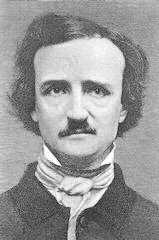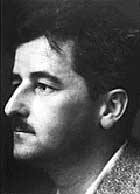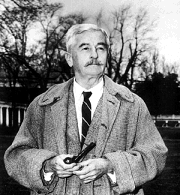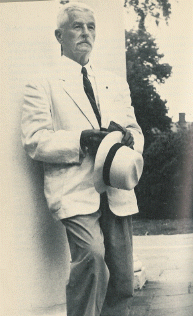
American
Romanticism:
Lecture notes
Southern Gothic
|
Poe (1809-49) |
announcements, assignments, midterm Poe stories: Laurie Forshage "Annabel Lee": Rachel Zoch [break] Faulkner: Ron Burton film noir |
|
Thursday 2 October: Edgar Allan Poe, N 671-75, 679-702 (“Ligeia” & “Fall of the House of Usher”); William Faulkner, "A Rose for Emily" N 2218-24.
text-objective discussion leader ("A Rose for Emily"): Ron Burton
text-objective discussion leader (Poe stories): Laurie Forshage
poetry: Poe, "Anabelle Lee," N 678
poetry reader / discussion leader: Rachel Zock
announcements
Card for Kate Hebert
TWO U. of H. PROFESSORS WILL DISCUSS
Admissions
Fellowships
Language Requirements
Strengths of the Department
UNIVERSITY OF HOUSTON
PH.D. in ENGLISH
and
PH.D. in COMPOSITION AND RHETORIC
Tuesday, October 14
5:45-6:45, Bayou 2104
Dr. Dorothy Baker
Director of Graduate Studies, University of Houston
Dr. James Zebroski
Professor of Rhetoric and Composition, University of Houston
RESCHEDULED PARTY
WELCOME
NEW LITERATURE GRADUATE STUDENTS!
WELCOME BACK
RETURNING LITERATURE GRADUATE STUDENTS!
YOU’RE INVITED
TO A PARTY!
SATURDAY, OCTOBER 18, 7-10
Bring a guest, if you wish.
At the home of:
Peter and Gretchen Mieszkowski
4023 Manorfield Dr.
Seabrook, TX 77586
281-474-3836
Featuring:
Get-to-know-each-other party games
Refreshments
Desserts by Drs. Diepenbrock and Klett
Last week's discussion of Hudson River School of American Romantic painters
Stark Museum of Western Art in Spring
assignments
Romanticism: New England Gothic
Thursday 9 October: Nathaniel Hawthorne, N 589-592, 605-622 (“Young Goodman Brown,” “May-Pole of Merry Mount,” & “Minister’s Black Veil”)
text-objective discussion leader ("Young Goodman Brown"): Christine Ford
text-objective discussion leader ("May-Pole" and/or "Black Veil"): Amy Sidle
poetry: Sylvia Plath, "Blackberrying," N 2658
poetry reader / discussion leader: Bundy Fowler
Poe: gothic
as sensation / psychology
Hawthorne: past as Puritan; light / dark as innocence / guilt + shades of gray
Poe: past as loss; gothic space as unconscious mind; house as head
both "Byronic heroes" or anyway byronic
dark, handsome, haunted men of "genius"
How do Poe, Byron, others fit model of Byronic Hero?
What significance of the Byronic hero?
Other possible topics:
Hawthorne's style, highly identifiable--when you read a Hawthorne story or novel, how can you tell it's Hawthorne?
midterm
Take-home midterm exam due by end of weekend following Thursday 9 October.
Leftover notes from previous classes
Last class's preview of Poe & Faulkner
Poe as "catalog of Romanticism"--His poems and stories are thick as fudge with standard Romantic attitudes and effects
passionate quests (learning, revenge, love, etc.) (quest as romance narrative)
loss (esp. "death of beautiful women")
supernatural (Romanticism doesn't have to go there, but if it's always escaping the here and now and testing boundaries, it's bound to go there sometimes)
the gothic--Poe = what most American readers think of when they think of "the gothic" and related genres
Poe & Faulkner as examples of European / Southern gothic
(contrast wilderness / Puritan gothic of Cooper, Irving, Hawthorne)
Southern USA remains strangely European in some ways: feudalism, stark divisions of rich and poor, "heritage" of past, social positions
general background on Poe
most popular writer in our course, maybe the only writer who many people would read without courses like ours
critical-scholarly status about Poe: always a little mixed.
Compare to Faulkner--probably America's greatest writer ever, at least in terms of critical respect. "America's Shakespeare" (But we don't study Faulkner as much in this course b/c he's only tangentially related to Romanticism through the gothic.)
Critical credit:
great "musical" quality in verse and prose
very high achievement in several short stories & poems
creator of several genres (detective story, early practitioner of science fiction)
admired and influential in Europe (French symbolist poets)
Comparable to Cooper in popularity and overseas influence
Critical doubt:
Poe concentrates on sensations and effects, therefore questionable depth
maybe just a lot of noise and horror
Poe as escapist fantasy, thrills and chills > appeal to dumb or ignorant aspects of popular mind
Questions for Poe:
What previous experiences studying / teaching Poe? Can people's reactions be connected to Romanticism?
How do you identify Poe's style? (again, connect to Romanticism)
Who thinks of Poe as an American writer? What can one learn about American Romanticism?
Poe as exemplary gothic writer--does he just re-cook gothic conventions, or does he actually develop the gothic?
Questions for Faulkner:
What kinds of continuity from Poe to Faulkner?
How does Poe turn Faulkner's "beauty as death of beautiful woman" around?
What does 20th century do with Romanticism?
Poe as “catalogue” of Romanticism
desire and loss
gothic
correspondence
romance
life / legend blurred; reality / romanticism
Poe’s style: extreme speech patterns (i. e., not everyday speech as in Realism)
desire and loss
713
return / loss
713
time after time . . . this hideous drama of revivification
romance
708 too divinely precious not to be forbidden! . . . Ligeia grew ill
724 Here is one of your favorite romances
725 knight and dragon
gothic
fair lady-dark lady
705 decaying city near Rhine
705 raven-black . . . tresses
709 an abbey, gloomy and dreary grandeur, melancholy and time-honored memories
709 arabesque
715 very ancient family (contrast Americans)
719 “The Haunted Palace”
722 vaults within building
722
donjon-keep / tomb immediately below narrator’s sleeping quarters
correspondence
1. act or state of corresponding, relation or agreement of things to each other
or of one thing to another.
2. intercourse between persons by letters
+ Romantic concept concerning relation between inner and outer world, soul and nature, self and cosmos
Emerson 488 every hour and change corresponds to and authorizes a different state of the mind
"Legend of Sleepy
Hollow"
2097 every sound of nature, at
that witching hour, fluttered his excited imagination
2107 sank deep in the mind of
Ichabod
2108 all the stories of ghosts
and goblins . . . came crowding upon his recollection. The night grew darker and
darker
711 must, after all, I considered, have been but the suggestion of a vivid imagination, rendered morbidly active by the terror of the lady, by the opium, and by the hour.
712 that fantastical chamber
714 first glimpse of building, insufferable gloom
pervaded my spirit [correspondence]
714 vacant eye-like windows
715
id house and family
718 superstition / building
718 identical Madeleine
718
mind = radiation of gloom
725 echo
725 exact counterpart
life / legend blurred; reality / romanticism
Poe’s style: what can and can’t be said (cf.
romance)
Language of extremes (cf. Romanticism)
Cf. Edwards, 216-17
706 the beauty of beings either above or apart from the earth
706 that something . . . what was it?
706 upon the very verge of remembering
706 (strange, oh strangest mystery of all!) [superlatives]
707 catalog (cf. Aleph)
708
[more superlatives] [romanticism as extremes]
708 even more energetic
719 within the compass of merely written words
721 I lack words to express . . .
721 gothic list of books, [allusion]
Faulkner
|
|
|
|
William Faulkner, N 2160-66.
Faulkner reading:
Discussion question:
What are the merits and limits of the Gothic's usefulness?
Where is it delightful and informative? Where does it descend to "same old same old?"
What principles for extending its usefulness?
genre or style discussion: be prepared to shift terms; no single word answers for all, and even a single word changes its meaning as context changes.
Other terms potentially associated with gothic: terror, suspense, ghost stories, the grotesque.
Like Romanticism, "Gothic" is a convenient term for drawing a lot of diverse phenomena into a common field of discussion, but stretching the term too far can destroy the concept's snap and vigor.
Poe
as unique writer
"Insane drug addict"
>unlucky, hardworking alcoholic
constant "rewriting" of Poe's life
2387 influences, contributions by Poe
loss of beautiful woman
Poe
as catalogue of American Romanticism
farewell Mohicans
intermixing of European Romanticism with American subject matter ("knights of the forest," Cooper as "the American Scott")
gothic space > wilderness
gothic secret > race mixing, dispossession (Lawrence on ghosts)
sublime scale of setting, titanic characters, combination of archaic and biblical speech (i. e., not everyday speech)
Romanticism as stretching boundaries of possible: plot devices of miraculous marksmanship, disguises, but also glimpse of possible relation between Cora and Uncas
romance narrative as journey > popular cliffhanger; capture, escape, pursuit
What's different about Mohicans from later Romanticism or Transcendentalism:
less internalized, characters as types, closed off to close identification




